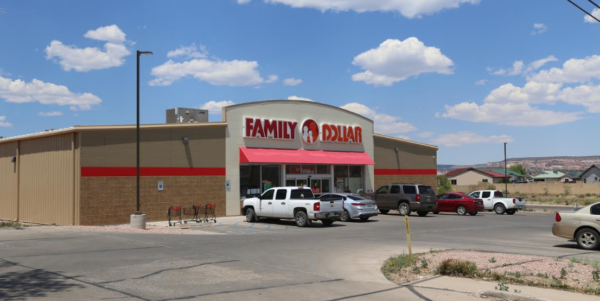
- Details
- By Levi Rickert
ST. MICHAELS, Ariz. — After the Navajo Nation showed its opposition late last month to Family Dollar’s application for a liquor license to sell liquor at its store on the Navajo Indian Reservation, the national discount chain withdrew its application with the Arizona Liquor Board.
The Navajo Nation Human Rights Commission announced on Thursday that Family Dollar withdrew its application.
According to the Apache County supervisors' clerk, “The St. Michaels Family Dollar store officially withdrew its application to sell liquor at its outlet. The store withdrew its application with the Arizona Department of Liquor. Therefore, Apache County supervisors will not be conducting a public hearing on the matter on July 28, 2020.”
The prospect of liquor faced opposition from both the executive and legislative branches of the Navajo Nation. On June 23, 2020, Navajo Nation President Jonathan Nez and Vice President Myron Lizer sent a letter to the Arizona State Liquor Board and the Apache County Board of Supervisors in which they strongly opposed Family Dollar’s notice of application to sell alcohol in their store located on fee land in the community of St. Michaels, Ariz.
“Our Navajo people took a strong position to oppose the liquor licenses and we also had the support of Coconino County and Apache County officials as well. This collective effort resulted in the withdrawal of the liquor license applications, which posed a direct threat to the health and safety of the residents of St. Michaels, Tuba City, and the entire Navajo Nation. Our Navajo People have a long, ongoing battle with alcohol and the devastation that alcoholism causes to our families and communities. Consumption of alcohol has contributed to increased incidence of domestic violence and other criminal activity, motor vehicle fatalities, and deaths caused by exposure to extreme weather conditions,” President Nez said.
“The Navajo people appreciate the business owner’s willingness to withdraw their application to sell liquor. Navajo communities prevailed, but how many times do we have to tell them no? They should get better acquainted with the people who make their business and know that it is not acceptable to sell liquor in close premises to the neighborhoods and near the capital of the Navajo Nation,” Jennifer Denetdale, chair of the Navajo Nation Human Rights Commission, said in a press release.
The Navajo Nation Human Rights Commission along with the Navajo Nation Council opposed Family Dollar’s application to acquire a liquor license.
“It is important for Navajo citizens to know that when businesses seek liquor licenses, only people that live or own businesses within a one-mile radius of the store have a say in the process. When a place is designated to sell liquor, it is very difficult to change the status. Arizona liquor department is not in the business to close liquor stores, except when the store violates the liquor laws,” said Leonard Gorman, the executive director of the Navajo Nation Human Rights Commission.
More Stories Like This
Native News Weekly (August 25, 2024): D.C. BriefsUS Presidents in Their Own Words Concerning American Indians
Oral History Project Announces 14th Stop in Portland, Oregon: NABS Continues to Gather Crucial Stories Across Indian Country
Navajo Gaming to Honor Veterans with Ceremony at Twin Arrows Casino Resort
Next on Native Bidaské: Honoring Native Veterans: A Call to Action from Those Who Served
Help us tell the stories that could save Native languages and food traditions
At a critical moment for Indian Country, Native News Online is embarking on our most ambitious reporting project yet: "Cultivating Culture," a three-year investigation into two forces shaping Native community survival—food sovereignty and language revitalization.
The devastating impact of COVID-19 accelerated the loss of Native elders and with them, irreplaceable cultural knowledge. Yet across tribal communities, innovative leaders are fighting back, reclaiming traditional food systems and breathing new life into Native languages. These aren't just cultural preservation efforts—they're powerful pathways to community health, healing, and resilience.
Our dedicated reporting team will spend three years documenting these stories through on-the-ground reporting in 18 tribal communities, producing over 200 in-depth stories, 18 podcast episodes, and multimedia content that amplifies Indigenous voices. We'll show policymakers, funders, and allies how cultural restoration directly impacts physical and mental wellness while celebrating successful models of sovereignty and self-determination.
This isn't corporate media parachuting into Indian Country for a quick story. This is sustained, relationship-based journalism by Native reporters who understand these communities. It's "Warrior Journalism"—fearless reporting that serves the 5.5 million readers who depend on us for news that mainstream media often ignores.
We need your help right now. While we've secured partial funding, we're still $450,000 short of our three-year budget. Our immediate goal is $25,000 this month to keep this critical work moving forward—funding reporter salaries, travel to remote communities, photography, and the deep reporting these stories deserve.
Every dollar directly supports Indigenous journalists telling Indigenous stories. Whether it's $5 or $50, your contribution ensures these vital narratives of resilience, innovation, and hope don't disappear into silence.
 The stakes couldn't be higher. Native languages are being lost at an alarming rate. Food insecurity plagues many tribal communities. But solutions are emerging, and these stories need to be told.
The stakes couldn't be higher. Native languages are being lost at an alarming rate. Food insecurity plagues many tribal communities. But solutions are emerging, and these stories need to be told.
Support independent Native journalism. Fund the stories that matter.
Levi Rickert (Potawatomi), Editor & Publisher

